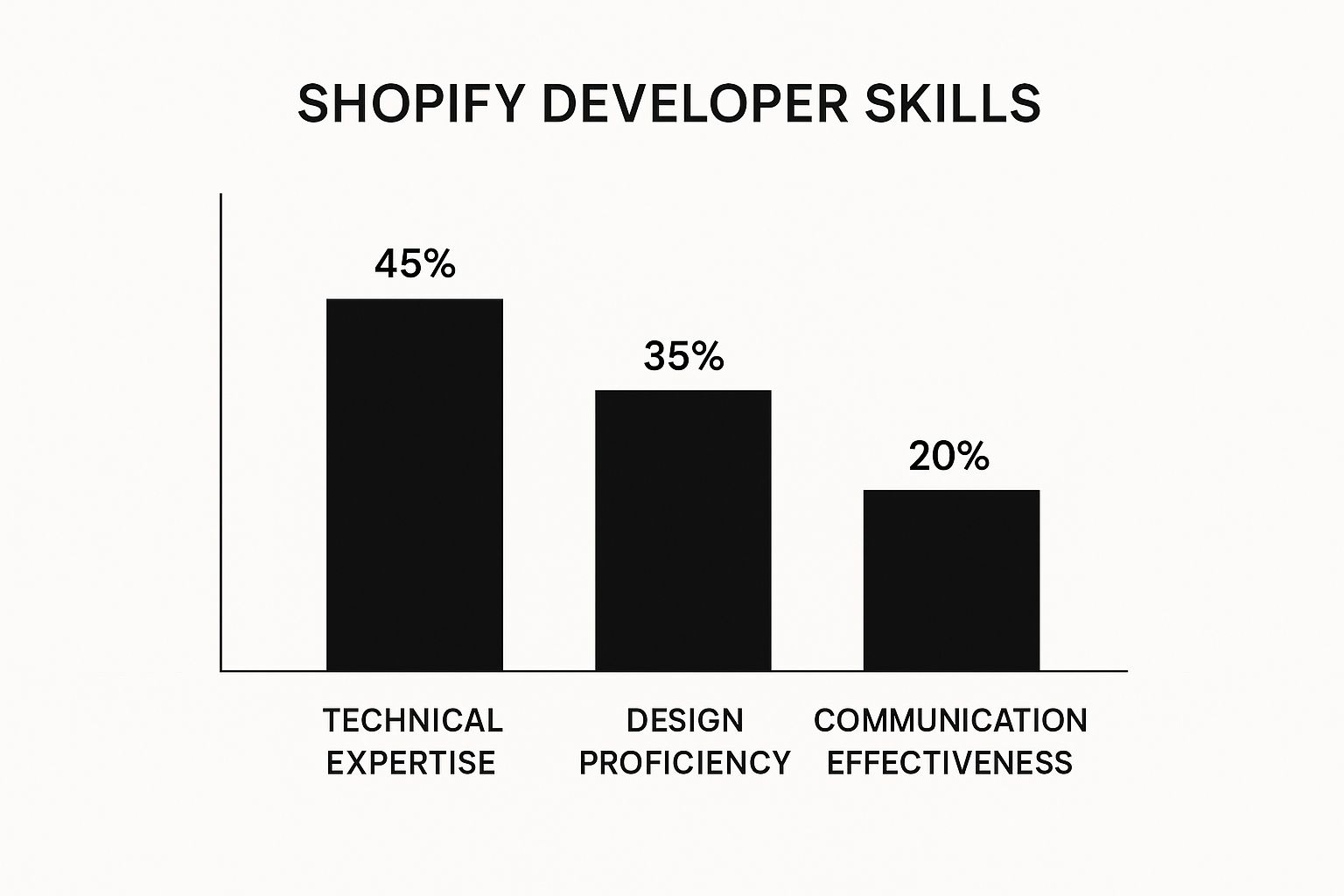Hire Someone to Build Shopify Store | Expert Tips
May 13, 2025

Why Smart Merchants Hire Shopify Experts
Building a successful online store takes more than just a visually appealing website. It requires a deep understanding of e-commerce principles, technical skills, and a strategic approach to conversion optimization. While building a store yourself might seem appealing at first, many smart merchants see the real benefits of hiring Shopify experts. These benefits translate into tangible results that significantly impact their profits.
Benefits of Professional Shopify Development
For example, consider time-to-market. Building a Shopify store from scratch can take a lot of time, especially if you aren't familiar with the platform. Hiring an expert can significantly speed up this process, letting you launch your store faster and start making money sooner. This efficiency frees up your time so you can focus on other key parts of your business, like product development, marketing, and customer service. You might be interested in: How to master Shopify benefits.
Shopify experts also bring a lot of experience and specialized knowledge. They understand the platform inside and out, including best practices for SEO, performance optimization, and user experience design. This expertise helps them create stores that not only look good but also work smoothly and turn visitors into paying customers. This is especially important in a competitive market where user experience can make or break a business.
Moreover, the sheer size of the Shopify ecosystem highlights the need for specialized expertise. As of the first quarter of 2025, there are approximately 2,557,517 live Shopify stores worldwide, a 6% year-over-year increase. This ongoing growth highlights Shopify's leading position in the e-commerce platform market. Find more detailed statistics here. In this competitive landscape, professional optimization is essential to stand out and gain market share.
Leveraging Expertise for Long-Term Success
This rapid growth also shows the increasing demand for skilled developers who can optimize stores for performance, user experience, and sales conversion. This means that hiring a Shopify expert isn't just about building a store. It's about investing in a long-term partnership that can lead to sustainable growth. Think of it like building a house: you could theoretically do it yourself, but hiring experienced architects and builders ensures a stronger, more functional, and ultimately more valuable result.
Calculating the True ROI of Expert Assistance
Finally, consider the hidden costs of do-it-yourself approaches. Small mistakes in design or functionality can lead to big losses in sales and customer satisfaction. Shopify experts can prevent these issues, ensuring a smooth and user-friendly experience that encourages conversions. This proactive approach reduces the risk of expensive revisions later and maximizes your return on investment. Hiring a Shopify expert is an investment in your store’s long-term success, ensuring it is not only built correctly but also optimized for continued growth and profitability.

Finding Your Perfect Shopify Developer Match
Choosing the right developer for your Shopify store is a big decision. It's a bit like hiring a property manager—you need someone reliable and skilled. Making the right choice is crucial for building a successful online store, especially considering Shopify's projected growth. This means understanding the different types of developers available and how to evaluate their skills.
Types of Shopify Developers
There are three main types of Shopify developers you can consider when you hire someone to build shopify store:
-
Freelancers: These are individual developers who work on a project basis. Freelancers are often a good choice for smaller projects or individual tasks, as they're typically more budget-friendly.
-
Specialized Agencies: These companies focus specifically on Shopify development. They offer a range of services, from customizing themes to developing apps. If you need specialized Shopify expertise, this is a good option.
-
Full-Service Partners: These agencies offer comprehensive services, including design, development, marketing, and ongoing support. They provide a more holistic approach, covering all aspects of your store's development.
To help you decide which type of developer best suits your needs, take a look at the comparison table below.
To help you decide which type of developer best suits your needs, take a look at the comparison table below. It breaks down the key differences, including cost, ideal use cases, pros, and cons.
| Developer Type | Cost Range | Best For | Pros | Cons |
|---|---|---|---|---|
| Freelancer | $50 – $150/hour | Small projects, budget-conscious businesses, individual tasks | Cost-effective, direct communication | Limited availability, potential for project delays, varied skill levels |
| Specialized Agency | $100 – $250/hour | Businesses needing specific Shopify expertise, complex projects, app development | Deep Shopify knowledge, dedicated teams, faster turnaround times | Higher cost than freelancers, less direct communication than freelancers |
| Full-Service Partner | $150 – $300+/hour | Businesses seeking comprehensive support, large projects, ongoing maintenance and marketing | End-to-end solutions, broader range of services, dedicated support | Highest cost, potential for less focus on specific Shopify needs |
This table summarizes the key differences between the three types of Shopify developers. Consider your budget, project scope, and desired level of support when making your decision.
Key Skills to Look For
A good Shopify developer needs more than just basic Shopify knowledge. They should also have a strong combination of technical skills and strategic thinking. This combination allows them to build a store that not only looks good but also performs well.
The infographic below shows the key skill distribution for a successful Shopify developer.

Technical Expertise makes up 45% of the skill set, highlighting the importance of a solid coding foundation. Design Proficiency (35%) and Communication Effectiveness (20%) are also crucial. A good developer needs to create a user-friendly store and communicate effectively with you.
Assessing Portfolios and Experience
When evaluating developers to hire someone to build shopify store, don't just look at the visual aspects of their portfolio. Dig deeper. Consider their understanding of conversion principles, user experience (UX), and technical performance. Look for evidence of user flow, intuitive navigation, and experience with relevant Shopify features and integrations.
Choosing the right developer is an investment in your business's future. Shopify merchants are expected to serve over 700 million customers in 2025, and stores processed $235.91 billion in gross merchandise volume (GMV) in 2023. You can find more detailed statistics here. Choosing the right developer helps position you to capture a share of this growing market.
Realistic Budgeting for Your Shopify Store Build
So, you're ready to hire someone to build your Shopify store? Let's talk budget. Knowing how much to invest and where is key to avoiding surprises and ensuring a successful launch. This section provides a transparent cost breakdown based on current market data and conversations with developers and merchants.
Understanding the Cost Factors
Several factors influence the overall cost of hiring a Shopify developer.
-
Store Complexity: A simple store with a standard theme and basic features will cost less than a complex store with custom functionality, integrations, and a unique design. Think bicycle versus car – more parts and engineering for the car means a higher price tag.
-
Developer Experience: Experienced Shopify developers with a proven track record command higher rates. Their expertise translates to a more efficient build, optimized performance, and fewer revisions. This is often worth the investment.
-
Pricing Structure: Developers typically use fixed-project or hourly rates. Fixed-project pricing provides a set cost, while hourly rates offer flexibility but can be harder to predict. The best choice depends on your project and risk tolerance.
-
Included Services: Some developers offer additional services like SEO optimization, marketing setup, and ongoing maintenance. These add to the initial cost but can be valuable, bundling services into a complete package.
Cost Breakdown by Store Complexity
To help illustrate the different pricing tiers available, here's a table summarizing typical costs and features.
Shopify Development Pricing Breakdown: Detailed breakdown of typical costs for different levels of Shopify store development
| Service Level | Price Range | Included Features | Timeline | Best For |
|---|---|---|---|---|
| Basic Setup | $500 – $2,000 | Basic theme customization, product upload, essential apps | 1-2 Weeks | Small businesses with limited budgets and simple product catalogs |
| Standard Build | $2,000 – $8,000 | Custom theme design, basic integrations, mobile optimization, SEO setup | 2-4 Weeks | Growing businesses with specific branding needs and moderate product catalogs |
| Advanced Development | $8,000 – $20,000+ | Custom app development, complex integrations, advanced features, ongoing support | 1-3 Months | Established businesses with complex requirements and large product catalogs |
This table shows how complexity, features, and pricing relate. Remember, these are estimates. Get detailed quotes from multiple developers before deciding.
Avoiding Budget Pitfalls
While a low price might be tempting, be wary of extremely cheap options. Inexperienced developers often cut corners, leading to technical issues and costly revisions. Investing in quality upfront saves money and frustration in the long run. It's like buying a cheap appliance – you’ll likely end up spending more on repairs or replacements. Also, be aware of unnecessary premium services. Work with your developer to identify essential features and integrations. For tips on starting with a smaller budget, check out our article on how to start an ecommerce business without money.

Allocating Your Budget Wisely
Effective budget allocation is crucial. Prioritize initial development for a solid foundation. Then, allocate funds for critical integrations like payment gateways, shipping providers, and marketing automation tools. Finally, budget for post-launch optimization: maintenance, performance monitoring, and conversion rate optimization. This structured approach maximizes your investment and builds a functional and profitable store.
Must-Have Skills in Your Shopify Developer
When you're looking to hire a Shopify developer, a polished portfolio is a good starting point. But truly understanding the essential skills can make all the difference between a thriving online store and a costly mistake. This means looking at both technical proficiency and a strategic understanding of e-commerce.
Technical Prowess: The Foundation of a Great Shopify Store
A strong Shopify developer needs a deep understanding of the platform's technical building blocks. This includes Liquid, Shopify's templating language. Liquid allows for dynamic content and customized storefronts. Think of it as the architect's blueprint, shaping your store's structure and function.
Your developer should also be comfortable with JavaScript, particularly for front-end enhancements and interactive elements that create a more engaging user experience.
Finally, a solid grasp of Shopify APIs is crucial. APIs connect your store with other vital services, like Stripe for payments, shipping providers, and marketing automation tools. This connectivity ensures a smooth and integrated shopping experience.
Beyond the Code: Strategic Thinking for E-commerce Success
Technical skills alone aren't enough. An exceptional Shopify developer understands the bigger picture of e-commerce. This includes strategic thinking about conversion optimization, designing user flows and interfaces that guide visitors towards purchases.
They also appreciate customer experience (CX) design. This involves creating intuitive navigation and a seamless checkout process that encourages repeat business.
In today's mobile-first world, a skilled developer prioritizes mobile responsiveness. This ensures your store looks and functions flawlessly across all devices, key to reaching a wider audience.
Evaluating a Developer's Skills: Asking the Right Questions
How do you assess these skills when hiring? Ask pointed questions. Regarding technical skills, inquire about their experience with Liquid, JavaScript, and specific Shopify APIs relevant to your project. For example, if you plan to integrate with a particular inventory management system, ask about their experience with that API.
For strategic thinking, discuss their approach to conversion optimization. How would they design a mobile-first shopping experience? Ask for examples of past projects where they improved a store's conversion rate or enhanced user experience. By digging deeper, you can identify developers with both the technical and strategic mindset needed.
This is important given Shopify's role in e-commerce. In 2023, Shopify stores processed an average of 199 million orders per month globally, and the platform hosted over 5.23 million active websites. More statistics can be found here. Choosing a developer who can handle this level of activity is crucial for your business.
Putting it All Together: Finding the Perfect Fit
Finding the right Shopify developer is about finding the right fit. By understanding the key skills – both technical and strategic – you can make an informed decision and invest in a partnership that sets your store up for success.
Where Savvy Merchants Find Qualified Shopify Builders
Finding the right developer to build your Shopify store can make or break your online success. It's the foundation upon which your entire online business is built. A shaky foundation leads to instability, while a strong one allows for sustainable growth. This section explores how successful merchants find qualified Shopify experts, giving you practical strategies for your own search.
Navigating the Shopify Ecosystem
The Shopify Experts Marketplace is an excellent place to start. This official platform features vetted agencies and freelancers with demonstrated Shopify experience. You can filter your search by specialization, budget, and location, which helps narrow down the options. However, don't restrict your search to just this one platform.
Exploring Alternative Avenues
Broaden your search by exploring freelance platforms like Upwork and Fiverr. These platforms offer a larger pool of talent, and you might find more competitive pricing. However, thoroughly vetting potential candidates is essential. Carefully examine portfolios, testimonials, and client feedback to guarantee quality and reliability. For additional tips on navigating the Shopify app landscape, check out this helpful resource: How to master finding the best Shopify apps.
Industry-specific communities and online forums can also be valuable resources for uncovering hidden talent. Engaging in these communities connects you with the collective knowledge and recommendations of experienced merchants. This direct feedback can be invaluable when making your decision.
Identifying Red and Green Flags
When evaluating potential developers, recognizing warning signs is crucial. Vague communication, a lack of a clear process, and unrealistic timelines are all red flags. Conversely, strong portfolios showcasing relevant experience, positive client testimonials, and proactive communication indicate a qualified and dependable developer. Think of it like interviewing a chef – you’d want someone with experience, creativity, and the ability to execute a recipe.
Evaluating Portfolios and Testimonials
A portfolio is more than just a collection of pretty websites. It’s a showcase of the developer's skills and abilities. Look for projects that demonstrate a deep understanding of e-commerce principles, such as conversion rate optimization and user experience. Don't hesitate to ask for case studies or specific examples of how they've helped other merchants achieve their business objectives.
Testimonials provide valuable insights from previous clients. Look for specific examples of how the developer delivered on promises, handled challenges, and communicated effectively throughout the project. These firsthand accounts provide a glimpse into what it's like to work with them.

Choosing the Right Fit for Your Needs
Ultimately, selecting the right Shopify builder depends on your specific needs and budget. By using these strategies, you can confidently navigate the hiring process and find a developer who can bring your vision to life. Building a successful online store is a marathon, not a sprint. Investing in a skilled developer upfront sets the stage for long-term growth and profitability.
Managing Your Shopify Build: From Hiring to Launch
Hiring a Shopify developer is the first step in building a successful online store. But just like building a house, you need more than just builders. You need a project manager to keep everything on track and within budget. Successfully managing your Shopify project from hiring to launch is crucial for a smooth process and a successful outcome.
Establishing Clear Expectations and Communication
Start by establishing clear expectations with your developer. This includes defining the project scope. Outline specific features, functionalities, and design preferences. This initial clarity acts as a blueprint, preventing scope creep and costly revisions later on. For example, specify the number of product pages, necessary integrations (like payment gateways and shipping providers), and your desired design aesthetics.
Effective communication is also essential. Set up regular communication channels and meeting schedules to discuss progress, address any concerns, and provide feedback. This ongoing dialogue ensures everyone stays informed and aligned, preventing miscommunication and potential project delays.
Milestone-Based Development and Scope Management
Use a milestone-based development process. Break the project into smaller, manageable milestones. Think design approval, theme development, app integration, and content upload. This approach creates clear objectives and allows for easier progress tracking. It's like checking off items on your to-do list, maintaining momentum and giving you a sense of accomplishment.
Effective scope management is vital. New ideas might come up during development, but it's important to stay focused on the initially agreed-upon scope. Document any changes or additions thoroughly, making sure they align with your budget and timeline. Changes are inevitable, but managing them effectively prevents project bloat and keeps costs controlled. When deciding where to find Shopify builders, explore various options like hiring freelancers in addition to traditional agencies.
Quality Assurance and Testing
Thorough testing before launch is essential. Test all the critical elements of your store, including the checkout process, product pages, mobile responsiveness, and integrations. This quality assurance phase helps identify and fix any bugs or usability problems before they impact your customers. It's like taking a test drive before buying a car—making sure everything works as it should. For more insights on selling effectively through your Shopify store, you might find this helpful: How to master selling on Instagram with Shopify.
From Development to Launch: A Smooth Transition
Finally, plan a smooth launch process. This includes finalizing content, setting up payment gateways, configuring shipping options, and conducting one last round of testing on all functionalities. A pre-launch checklist ensures a seamless transition from development to a live, functioning store. Launching a Shopify store has many moving parts. By actively managing the process from hiring to launch, you set yourself up for success. Following these strategies will equip you to navigate the challenges and bring your online store vision to life.
Maximizing ROI After Your Store Launch
Launching your Shopify store is just the beginning. Your relationship with a Shopify developer shouldn't end on launch day. A continued partnership can significantly improve your store's performance and maximize your return on investment (ROI). Just like regular car maintenance ensures better performance, a consistently updated and optimized Shopify store yields greater returns.
Ongoing Collaboration for Continuous Improvement
Maintaining an ongoing relationship with your developer allows for strategic enhancements and optimizations based on data and user feedback. It's like having a dedicated pit crew constantly fine-tuning your race car's engine. This continuous improvement is crucial in e-commerce, where trends and customer preferences constantly evolve.
After launch, collaborate with your developer on conversion optimization programs for measurable revenue growth. These programs might include A/B testing different layouts, optimizing checkout flows, or personalized product recommendations. These targeted improvements directly impact your profits. You might be interested in: Learn more in our article about Shopify conversion optimization.
Structuring Post-Launch Relationships
Several effective models exist for post-launch collaboration. Retainer arrangements offer ongoing support and maintenance for a fixed monthly fee, ensuring your store runs smoothly. This proactive approach prevents technical issues and downtime, which can severely impact sales.
Performance-based agreements link the developer's compensation to specific metrics like conversion rates or sales growth. This incentivizes the developer to focus on results and ensures you receive value for your investment. It's a win-win, aligning your goals with the developer's.
Measuring the Impact of Development Investment
Tracking key performance indicators (KPIs) helps assess the effectiveness of ongoing development. Monitor metrics like conversion rate, average order value, customer lifetime value, and bounce rate to make informed decisions about future enhancements. Data-driven decisions ensure you’re focusing resources on the most impactful improvements. Regular communication with your developer allows you to discuss performance, identify areas for improvement, and adjust strategies.
Investing in post-launch development is a strategic investment in your store's growth and long-term profitability. Partnering with a skilled Shopify developer can transform your store into a high-performing sales machine.
Looking for a powerful tool to optimize your Shopify store? LinkShop is a link-in-bio app designed for Shopify merchants. Create stunning, shoppable link-in-bio pages that drive traffic and boost sales. Check out LinkShop today: https://getlinkshop.com



